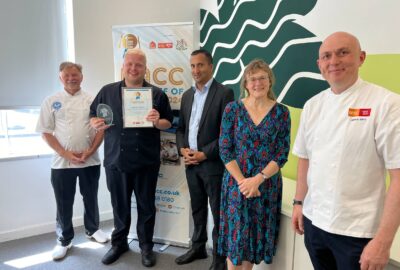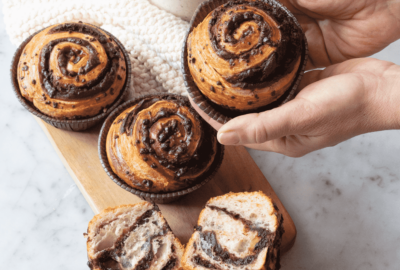Nicole Pisani’s culinary journey has been an adventure which has taken her from her home in Malta to Sydney then London, where she ended up at Yotam Ottolenghi’s Soho restaurant.
A high-powered career in restaurants beckoned but then she gave it up to work in the kitchen of a Hackney primary school, after reading a tweet from Leon founder and school meals campaigner Henry Dimbleby. She also runs a charity, Chefs in Schools, which aims to appeal to those in the restaurant industry who are looking for a career change.
How do you think the general public perceive school meals?
How has this changed over the last decade? I think after the Jamie Oliver revolution, people have started to talk about how we can serve better food in school. There is still a huge hype around chefs entering schools and helping school education. School meals still have a mixed reaction – it just depends on the person in the school cooking the meals. ‘Better is possible’ but you’re only going to have bread made from scratch if the person in the kitchen loves cooking.
Should packed lunches be banned from schools?
Yes. All children should have a hot nutritious meal and they should eat together. We need a link between education and the dining hall. For example, the children can make gyozas in cooking lesson then eat them the next day for lunch. These steps can change the way children eat and approach food.
How can secondary schools compete with the High Street and keep pupils on campus at lunchtime?
I work in two secondary schools and this is exactly what we’re tackling. We don’t say this is healthy food for you but we do tell them it’s cooking from scratch. Street food influences are really important and the thing we sell the most is a jerk chicken burger with no mayo just crispy skin and skinny slaw served in a brioche bun. We try to give them a healthy version of their favourite dishes, such as pizza but with a sourdough base. We try to make the link to awareness of why are we eating this food and why is it better for us – but not forcing it.
What prompted you to give up a successful career at a top London restaurant to work in a school kitchen?
It was originally purely out of needing more balance in my life and less hours. As soon as I had my first day I realised it was a really good option for anyone who wants to take forward the knowledge that they have and teach kids and kitchen staff. Making a difference is so rewarding. That feeling of giving something not just paying the bills, feels really good.
How has your restaurant training impacted on the way you run your school kitchens?
I use a kitchen brigade system, putting my teams in chef jackets and giving them sections. It’s about understanding kitchen etiquette and trying to bridge the school kitchen to be more managed and organised. I also give my teams different job titles – head chef, sous, kitchen porter, chef de partie – rather than “school cook”. Acting more as a team makes them feel the kitchen is an important part of the school. A lot of school ktchens feel like they have a separate identity – but we are part of the bigger picture.
Following the School Food Plan, are schools finally getting it right?
Hopefully yes! I guess a lot of schools have different models and we’re trying to show that what we’re doing works. If we all come together we’ve got a chance to change the fundamental things that children think about food. We’re giving it all we can and throwing everything we can at it.
In your opinion, should all school pupils receive free school meals?
Yes. The Borough of Islington offers free school meals to all children in primary schools, not just those in reception to Year 2. It’s important for their education and children learn better if they have eaten well. For some children it can be the only hot meal that they get. It gives them the energy to continue their learning and concentrate in class.
You also run the cooking curriculum at your schools. Tell us about that.
We realised that if children get excited about different produce, such as shellfish, and are able to smell and taste and touch it, they push back a lot less. So we get them excited about food by growing mushrooms in the classroom and going out foraging. We’ve butchered chickens and cooked over fire. The excitement for our lessons is crazy!
We’re astounded by how much they can actually get done.
What single piece of advice can you offer a school which is looking to improve its lunch offering?
Get in touch with Chefs In Schools! We’re currently launching a “Road Map Program” where we go into schools and do a small audit to come up with ways schools on small budgets can improve their school meals.
How is ‘Chefs in Schools’ helping to turn the tide?
This year alone we have recruited six really good chefs from industry to go into schools and share their knowledge with children. They’re all London-based but we are slowly trying to work out how we can branch out. We have lots of schools getting in touch and where we can we cluster them together.
What would you say to a restaurant chef who is considering making the move into education catering?
It’s perfect for feeling that you’re doing something with the skills you’ve learned throughout your career. We’re always trying to find good chefs to go into schools so get in touch!
And now for three questions that we ask all of our Leading Lights
1. What are your three kitchen secrets?
i) Use quite a lot of butter to make food taste good.
ii) I can’t live without sharp knives
iii) We always serve vegetables as well as ‘sneaking’ them in.
2. What is your favourite ingredient and why?
Currently it’s horseradish. It has a kick and if you grate a little bit of it on meat, fish or vegetables like cauliflower, it makes it taste amazing.
3. Please could you share your favourite recipe, along with your reasons for choosing it?
Edible gardens! We serve these occasionally at Gayhurst – the children love pulling the vegetables out of the soil and it’s a real talking point.



